Test SearchGPT! OpenAI invades Google's search bar, shaking up the trillion-dollar search market
![]() 08/14 2024
08/14 2024
![]() 664
664
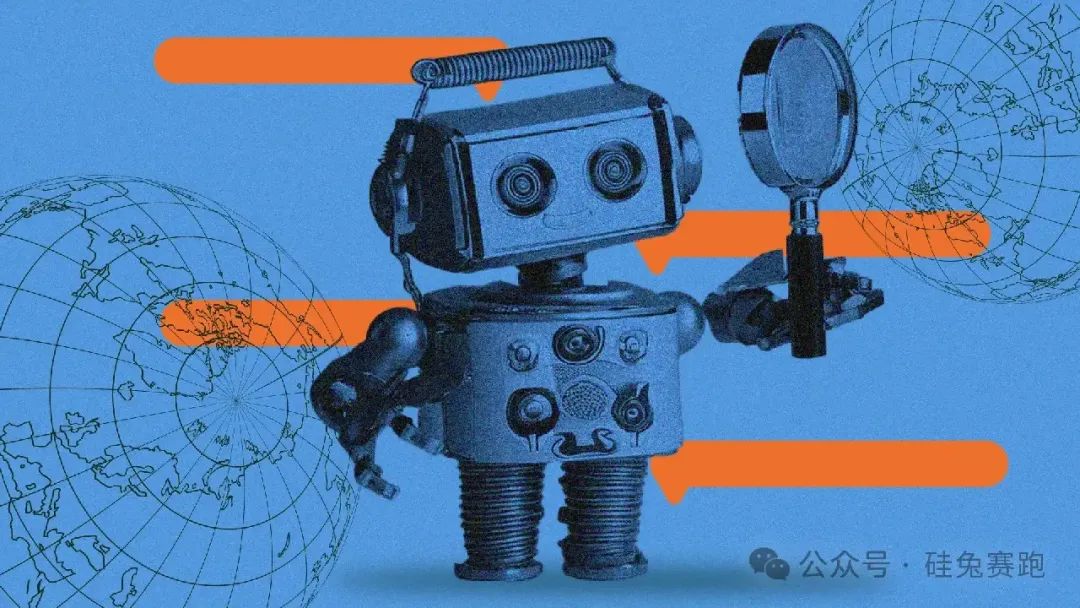
Author | Eric, Editor | Zuri
“A new ‘Three Kingdoms’ battle is underway.”
On July 26, OpenAI announced that it was testing a new AI search tool called SearchGPT, planning to integrate it with ChatGPT to provide users with more timely and accurate information.
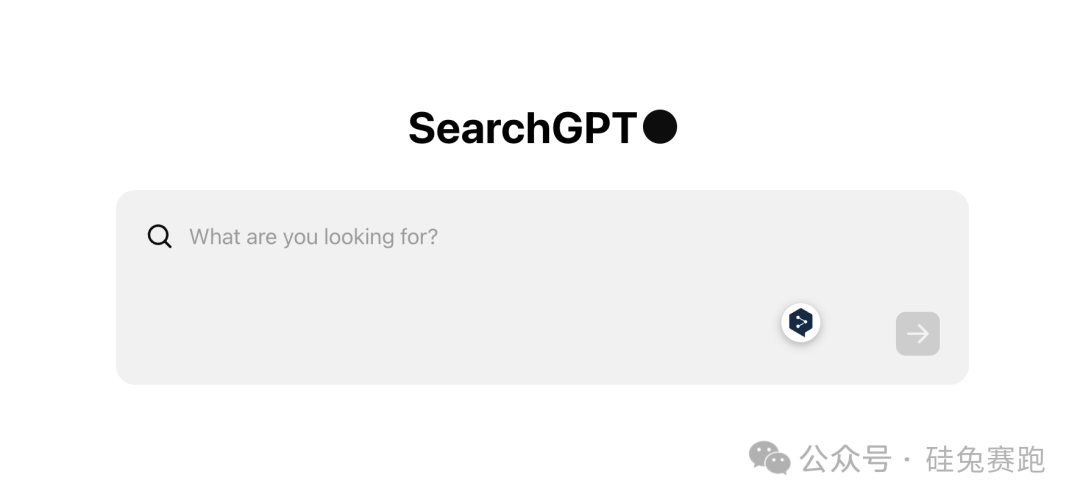
This means OpenAI has directly challenged two major players in the search field—traditional search giant Google and AI search engine startup Perplexity.
The Financial Times reported that OpenAI is poised to invade Google's $175 billion search business market.
Additionally, another player, Perplexity, valued at $3 billion, is also eager to compete. It is rapidly growing and favored by many influential figures. NVIDIA founder Jen-Hsun Huang previously claimed to use Perplexity daily. However, Perplexity's indecisiveness about commercialization adds significant uncertainty.
In summary, Google, OpenAI, and Perplexity are all accelerating their AI search strategies, igniting a new “Three Kingdoms” battle. Who will emerge victorious in this race?
01
Satisfactory but Room for Improvement in SearchGPT
Shortly after SearchGPT's launch, we obtained a test account. After using SearchGPT for two weeks, our primary impression was its impressive search speed!
Compared to Perplexity's free account, Bing Search, and interactions with ChatGPT, SearchGPT's search speed is lightning-fast, rivaling Google's keyword search capabilities.
However, our private assessment of SearchGPT's limitations is: 1) The user interface is relatively simple and somewhat rudimentary compared to Perplexity;
2) The sources of retrieved and synthesized information seem limited, providing less valuable information for open-ended questions than Google.
After two weeks of use, we recommend combining SearchGPT and Google Search. For quick information, use SearchGPT, but for in-depth exploration or brainstorming, rely on Google. Thus, complete reliance on Google remains essential.
SearchGPT excels at handling questions like, “Financing and valuation information for Perplexity,” which have clear and constrained answers.
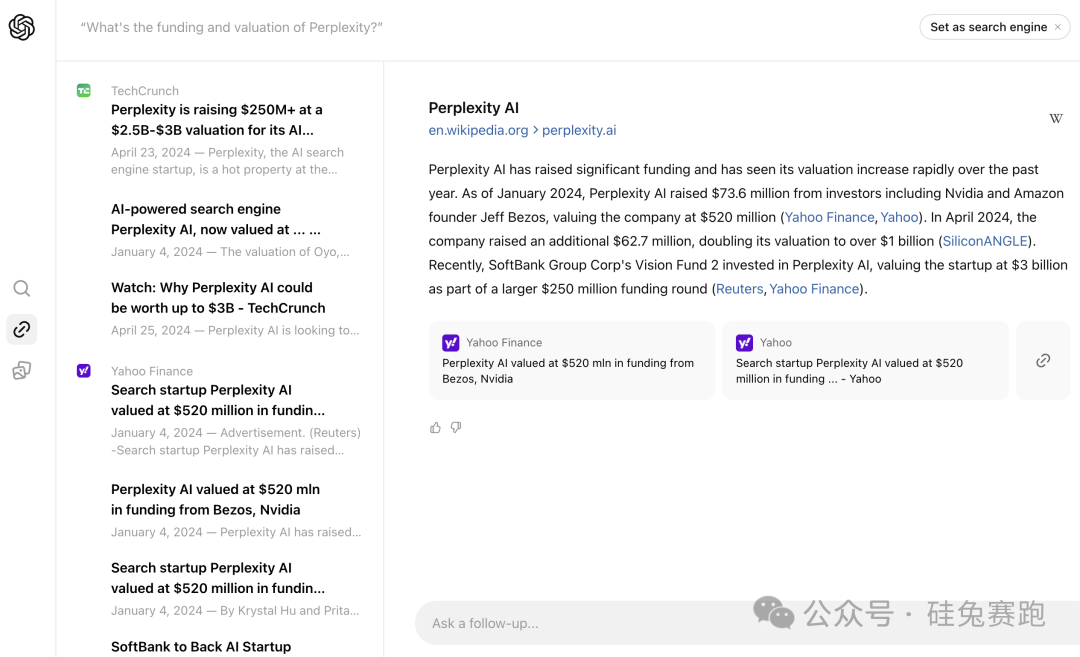
The left menu bar displays SearchGPT's current three supported functions: search, view indexed links, and search images. For the given question, SearchGPT provided 20 search results, a noticeable gap compared to Google's search volume.
Furthermore, SearchGPT incorporates some capabilities of ChatGPT, such as searching for the latest status (IPO, M&A, or private equity status) of a series of company names based on user input.
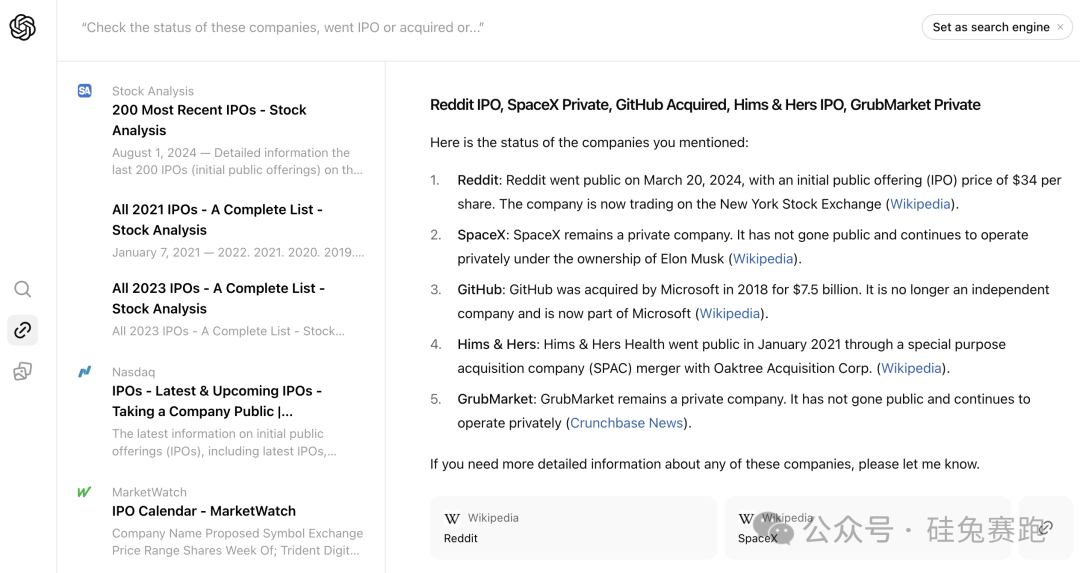
This is a capability Google lacks.
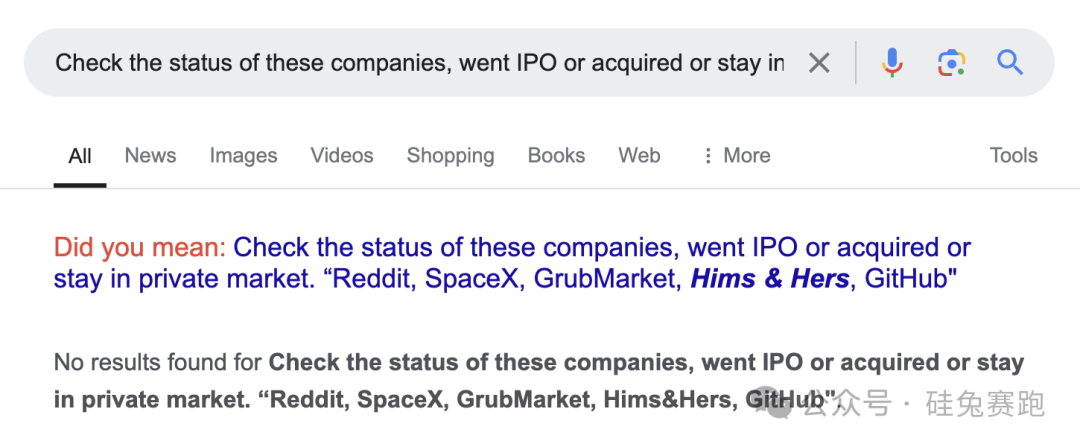
However, for open-ended questions or when seeking more related information for further exploration, SearchGPT's information resources are limited (typically providing 10 indexed items, while Google's first two pages offer double that amount), insufficient for such needs.
Nevertheless, SearchGPT's trump card is its ease of use—setting SearchGPT as the default search engine in Google Chrome redirects users to the Chrome Web Store, where they can integrate it into their browser, replacing the default Google Search.
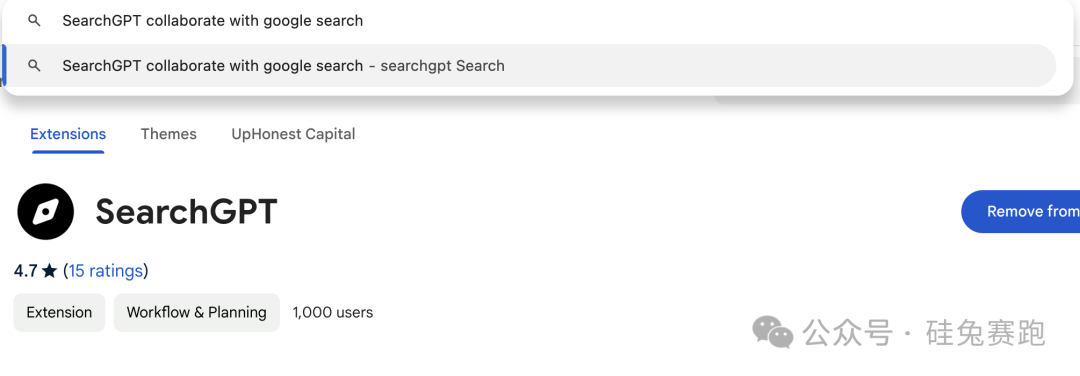
In a sense, SearchGPT directly “hijacks” Google Chrome's default search engine. Undoubtedly, this enhances SearchGPT's convenience, effectively stealing users from Google.
02
Perplexity's Aggressive Entry
Perplexity offers more “certainty” and “richness” in the search experience, positioning itself as a challenger to Google.
Founded in 2022 by former OpenAI researcher Aravind Srinivas and former Meta scientist Denis Yarats, among others.
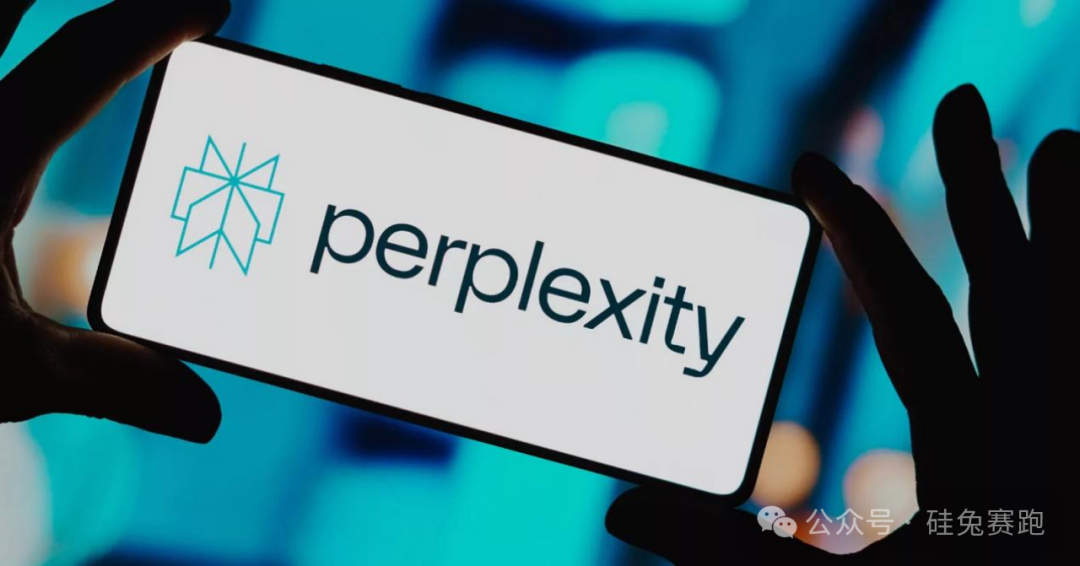
Whether SearchGPT drew inspiration from Perplexity is unclear, but the two share remarkable similarities in functional experience. For instance, Perplexity leverages AI to provide users with direct search answers rather than simply links to websites.
Additionally, all Perplexity answers are sourced, akin to scholarly citations. For example, searching “Paris Olympics” displays answers sourced from reputable outlets like Reuters and Bloomberg, accompanied by related questions like “Medal-making process for Paris Olympics” and “Competition schedule for Paris Olympics.” These are called “follow-up questions” and can be further explored if of interest.
Perplexity also enhances “certainty” by allowing users to restrict searches to specific databases, such as YouTube, Reddit, or academic journals.
In 2023, Perplexity surpassed 10 million monthly active users and processed over 5 billion queries, aiming for a tenfold increase in both metrics in 2024.
Aravind Srinivas once declared, “Google will be seen as traditional and outdated, while Perplexity represents the next generation and future of search.”
Google's response to this challenge has been dismal.
03
Common Issue Among the Big Three: Information Accuracy
During its annual I/O developer conference in May, Google proudly introduced AI Overviews, integrating AI into its core search business.
In brief, AI compiles an overview at the top of search results, enabling users to quickly find answers without clicking multiple links. At the time, Google CEO Sundar Pichai claimed this was the biggest change in search in 25 years.
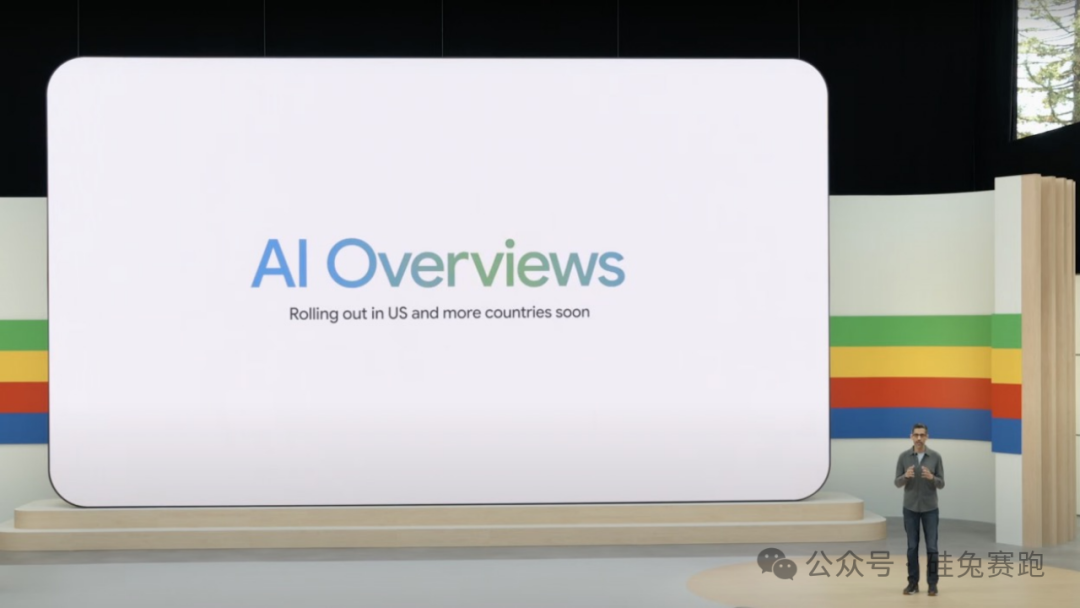
However, AI Overviews was soon discontinued due to displaying absurd and incorrect answers for some queries, prompting backlash from users.
One notorious example involved the response to “Cheese doesn't stick to pizza crust,” suggesting adding “1/8 cup of non-toxic glue to the filling.”
Similarly, SearchGPT faces accuracy issues.
A user searching “Music festivals in Boone, NC, in August” was incorrectly informed that the Appalachian Summer Festival would be held from July 29 to August 16, whereas it actually starts on June 29 and ends on July 27.
Not only SearchGPT, but Perplexity also struggles with inaccuracies.
Wired discovered that Perplexity used third-party content crawlers to access restricted website content. Wired also noted that Perplexity's answers could misinterpret article content or spread misinformation.
Aravind Srinivas responded firmly, blaming the third-party crawlers, not Perplexity itself.
However, when confronted by publishers, Perplexity softened its stance. After Forbes accused Perplexity of stealing text and images, infringing on its copyright, Aravind Srinivas admitted flaws in the product's functionality and pledged to improve through feedback.
Aravind Srinivas also stated that the company is working to establish revenue-sharing agreements with publishers to address ongoing issues.
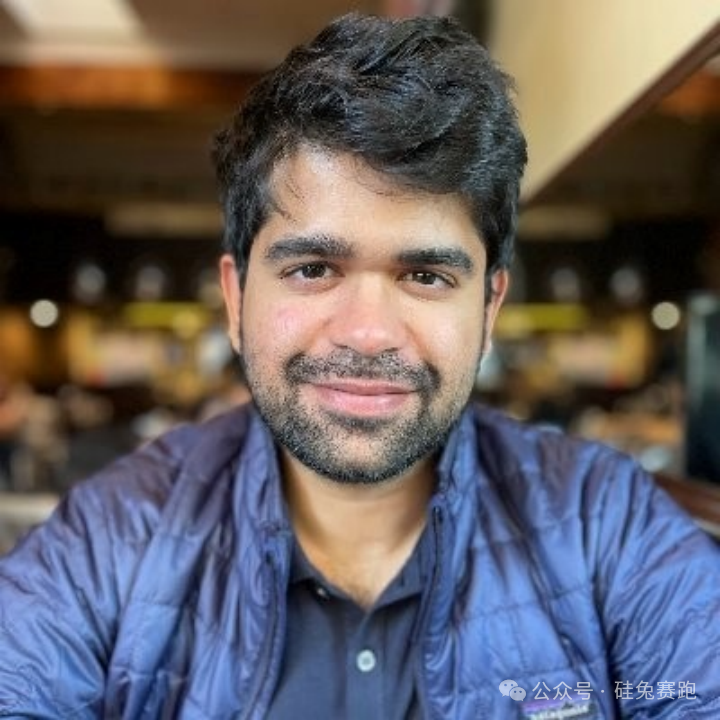
In the AI era, news organizations are adopting various strategies to protect their copyrights. OpenAI seems aware of this trend, emphasizing that SearchGPT was developed in collaboration with publishers like News Corp, Associated Press, The Atlantic, and VoxMedia. Publishers can choose to display their content in search results without using it to train OpenAI's models.
Clearly, AI search must overcome the hurdles of accuracy and copyright to advance.
04
Commercialization: The Key to Winning in AI Search
AI search is the future trend, posing increasing challenges to traditional search.
According to Extraordinary Production Research , in March 2024, AI search products accounted for 24.21% of global web traffic, becoming the second-largest AIGC segment after chatbots.
Amid this trend, Microsoft explored integrating its generative AI product Copilot into Bing last September. Results were impressive, with Bing's daily active users exceeding 140 million in Q3 2024, a year-over-year increase of over 40 million.
Meanwhile, traditional search is under severe pressure. Gartner predicts a 25% decline in traditional search queries by 2026.
GS Statcounter data shows Google's search engine market share dropped to 86.99% in April 2024, its lowest since 2009.
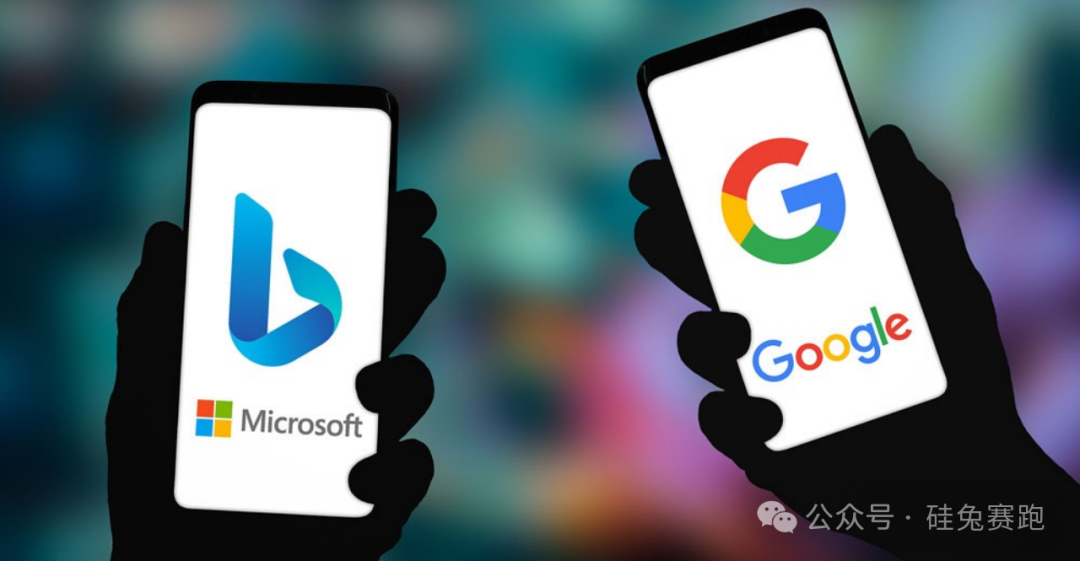
As AI search gains momentum and traditional search declines, can AI search startups capitalize on this trend? No. They must address commercialization challenges.
Traditional search relies on a free-to-use model for end-users and advertising revenue from businesses. Higher click-through rates and traffic equate to more advertising income. In 2023, Google's advertising revenue reached $237.8 billion, accounting for 77.4% of its total revenue.
Aravind Srinivas previously dismissed the advertising business model, stating that Perplexity's goals significantly differ from Google's, as Google typically reduces search efficiency to generate more ad revenue by increasing browsing time and click-through rates. In contrast, Perplexity aims to provide concise and precise answers, reducing information access time. For profit, Perplexity relies on paid subscriptions rather than ads.
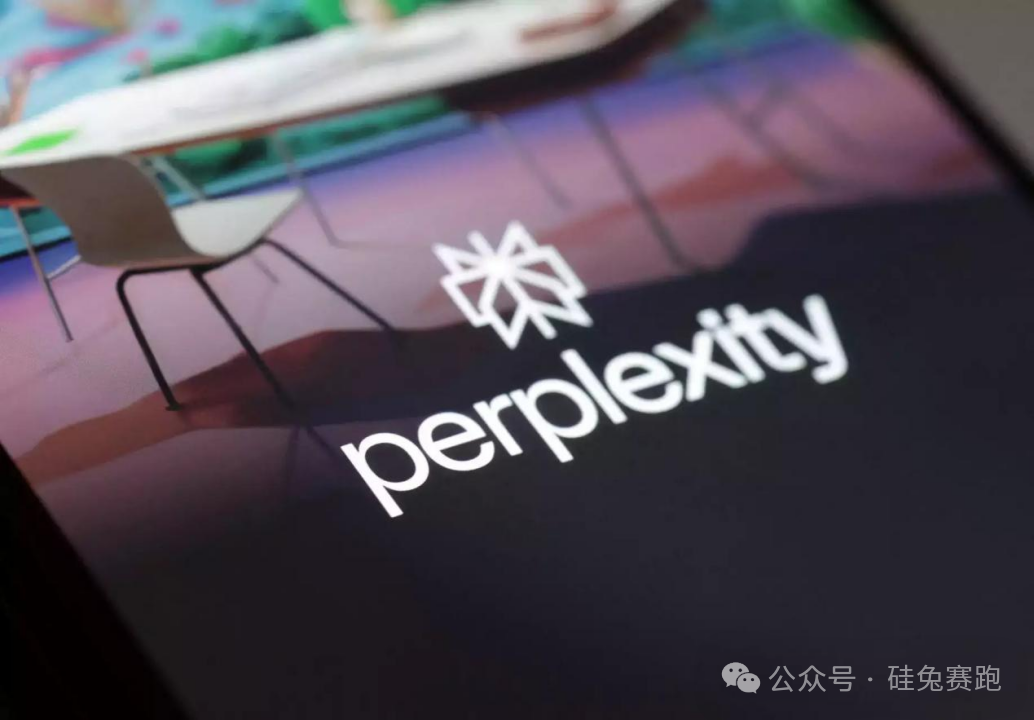
However, Aravind Srinivas' stance was soon contradicted.
Now, the phrase 'not influenced by advertising-driven models' has been removed from Perplexity's official website. Dmitry Shevelenko, Perplexity's Chief Commercial Officer, publicly stated, "Advertising has always been part of our business." In April, foreign media reported that Perplexity would start selling ads.
The shift towards ad revenue is due to Perplexity's uncertain profitability. The Wall Street Journal reported that Perplexity's annual revenue exceeds $10 million, but this pales in comparison to its high costs. According to estimates by China International Capital Corporation, Perplexity's cost per query using Bing's search engine and GPT-4 is approximately $0.03, leading to an annual cost of $60 million.
As a result, Perplexity accelerated its fundraising pace. In June, Reuters reported that Perplexity would receive $10-20 million from SoftBank Vision Fund 2, with the round expected to raise $250 million, valuing the company at $3 billion.
While $250 million seems substantial, it falls short of Google's daily revenue.
Similarly, SearchGPT will also face commercialization challenges in balancing costs and benefits.
The Information reported that OpenAI's AI training and inference costs could reach $7 billion this year, with millions of free ChatGPT users further increasing computational costs. SearchGPT must also swiftly identify a profitable model.
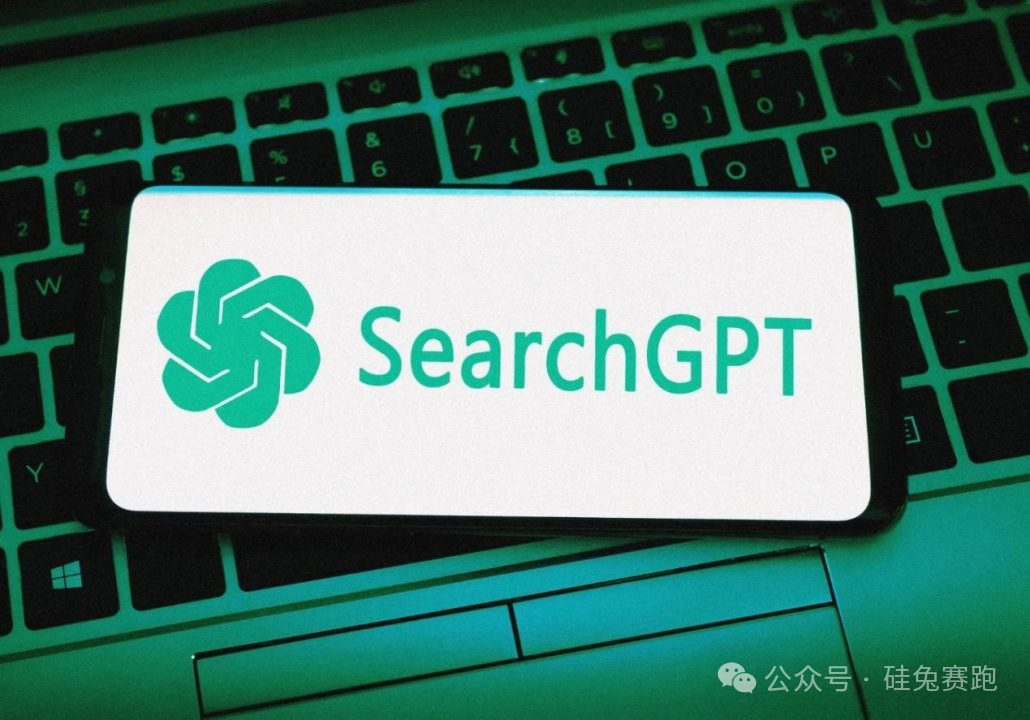
Current AI search platforms have a low likelihood of replacing Google in the short term.
Google's fundamentals remain strong, with Q2 2024 revenue growth of 14% to $84.7 billion. It boasts over 2 billion users and a substantial market share. Compared to this giant, Perplexity and SearchGPT are still in their infancy.
In recent interviews, Aravind Srinivas softened his stance, stating that Perplexity's goal is not to replace Google but to excel in information integration, where Google excels in simple navigational queries. He noted that true impact in search lies not in replicating Google but in doing what they do not.
The future competitive landscape among Google, Perplexity, and SearchGPT remains uncertain, subject to time's test. For small and medium entrepreneurs, AI search may not be an optimal sector due to high costs and the risk of compromised user experience through excessive commercialization. Without substantial funding, most small players risk being marginalized.







